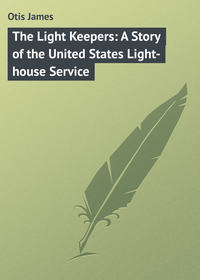 полная версия
полная версияAunt Hannah and Seth
Then the little woman gave free rein to her curiosity, by asking:
"Where are you going, my boy?"
"That's what I don't just know," Seth replied, after a short pause. "Pip Smith, he said the country was a terrible nice place to live in, an' when Snip an' I had to come away, I thought perhaps we could find a chance to earn some money."
"Haven't you any parents, or a home?" Aunt Hannah asked in surprise.
"I don't s'pose I have. I did live over to Mr. Genet's in Jersey City; but he died, an' I had to hustle for myself."
"Had to what?" Aunt Hannah asked.
"Why, shinny 'round for money enough to pay my way. There ain't much of anything a feller like me can do but sell papers, an' I don't cut any big ice at that, 'cause I can't get 'round as fast as the other boys."
"Did you earn enough to provide you with food, and clothes, an' a place to sleep?"
"Well, sometimes. You see I ain't flashin' up very strong on clothes, an' Snip an' I had a room down to Mother Hyde's that cost us eighty cents a week. We could most always get along, except sometimes when there was a heavy storm an' trade turned bad."
"I suppose you became discouraged with that way of living?" the little woman said reflectively.
"Well, it ain't so awful swell; but then you can't call it so terrible bad. Perhaps some time I could have got money enough to start a news-stand, an' then I'd been all right, you know."
"Why did you come into the country?"
"You see we had to leave mighty sudden, 'cause – "
Seth checked himself; he had been very near to explaining exactly why he left New York so unceremoniously. Perhaps but for the "prayers before breakfast" he might have told this kindly faced little woman all his troubles; now, however, he did not care to do so, believing she would consider he had committed a great crime in passing a lead nickel, even though unwittingly.
Neither was he willing to tell so good a woman an absolute untruth, and therefore held his peace; but the flush which had come into his cheeks was ample proof to his hostess that in his life was something which caused shame.
Aunt Hannah looked at him for an instant, and then as if realizing that the scrutiny might cause him uneasiness, turned her eyes away as she asked in a low tone:
"Do you believe it would be possible for you to find such work in the country as would support you and the dog?"
"I don't know anything about it, 'cause you see I never was in the country before," Seth replied, decidedly relieved by this change in the subject of conversation. "Pip Smith thought there was milk an' pies layin' 'round to be picked up by anybody, an' accordin' to his talk it seemed as if a feller might squeak along somehow. If I could always have such a bed as I got last night, the rest of it wouldn't trouble a great deal."
"But you slept in the barn!" Gladys cried.
"Yes; it was nicer than any room Mother Hyde's got. Don't boys like me do something to earn money out this way?"
"The farmers' sons find employment enough 'round home; but I don't think you would be able to earn very much, my boy."
"I might strike something," Seth said reflectively. "At any rate, Snip an' I'll have to keep movin'."
"Then you have no idea where you're going?" And Aunt Hannah appeared to be distressed in mind.
"I wish I did," Seth replied with a sigh, and Gladys said quickly:
"You can't keep walkin' 'round all the time, for what will you do when it rains?"
"Perhaps I might come across a barn, same's I did last night."
"And grow to be a regular tramp?"
"I wouldn't be one if I was willin' to work, would I? That's all Snip an' me ask for now, is just a chance to earn what we'll eat, an' a place to sleep."
Aunt Hannah rose from the table quickly in apparently a preoccupied manner, and the conversation was thus brought to an abrupt close.
Snip, who had already breakfasted most generously, scrambled to his feet for another excursion into the wonderful fields where he might chase butterflies to his heart's content, and Seth lingered by the open doorway undecided as to what he should say or do.
Gladys began removing the dishes from the table, Aunt Hannah assisting now and then listlessly, as if her mind was far away; and after two or three vain efforts Seth managed to ask:
"How much will I have to pay for breakfast an' sleepin' in the barn?"
"Why, bless your heart, my boy, I wouldn't think of chargin' anything for that," the little woman said, almost sharply.
"But we must pay our way, you know, though I ain't got such a dreadful pile of money. I don't want folks to think we're regular tramps."
"You needn't fear anything of that kind yet a while, but if it would make you feel more comfortable in mind to do something toward payin' for the food which has been freely given, you may try your hand at clearin' up the barn. Gladys an' I aim to keep it cleanly; but even at the best it doesn't look as I would like to see it."
Seth sat about this task with alacrity, although not knowing exactly what ought to be done; but the boy who is willing to work and eager to please will generally succeed in his efforts, even though he be ignorant as to the proper method.
It was while working at that end of the barn nearest the house at a time when Aunt Hannah and Gladys were standing at the open window washing the breakfast dishes, that he overheard, without absolutely intending to do so, a certain conversation not meant for his ears.
It is true he had no right to listen, and also true that the hum of voices came to his ears several moments before he paid any attention whatsoever, or made an effort to distinguish the words.
Then that which he heard literally forced him to listen for more.
It was Aunt Hannah who said, evidently in reply to a suggestion from Gladys:
"It is a pity and a shame to see a child like that poor little lame boy wandering about the country trying to find work, when he isn't fitted for anything of the kind. But how could we give him a home here, my dear?"
"I am sure it wouldn't cost you anything, Aunt Hannah. With three spare rooms in the house and hardly ever a visitor to use one of them, why couldn't he have a bed here?"
"He can, my dear, and it's my duty to give him a home, as I see plainly; but you can't imagine what a cross it will be for me to have a boy and a dog around the old place. I have lived here alone so many years, except after you came, that a new face, even though it be a friendly one, disturbs me."
"Surely you'd get used to him in a few days, and he's a boy who tries to do all he can in the way of helping."
"I believe so, my dear, and, therefore, because it seems to be my duty, I'm goin' to ask him to stay, at least until he can find a better home; but at the same time I hold that it will be a dreadful cross for me to bear."
Seth suddenly became aware that he was playing the part of a sneak by thus listening; and although eager to hear more, turned quickly away, busying himself at the opposite side of the barn, where it would not be possible to play the eavesdropper in even so slight a degree.
Until now it had never come into his mind that this little woman, whose home was so exceedingly inviting, might give him an opportunity to remain, even for the space of twenty-four hours; but as it was thus suggested, he realized how happy both he and Snip would be in such a place, and believed he could ask for nothing more in this world if it should be his good fortune to have an opportunity to stay.
There was little probability the officers of the law would find him here, however rigorously the search might be continued, and it seemed as if every day spent in such a household must be filled with unalloyed pleasure.
He stopped suddenly in his work as the thought came that it had already been decided he should have an invitation to remain, and a great joy came into his heart just for an instant, after which he forced it back resolutely, saying to himself:
"A feller who would bother a good woman like Aunt Hannah deserves to be kicked. She's made up her mind to give me a chance jest 'cause she thinks it's something that ought'er be done; but I ain't goin' to play mean with her. It's lucky I happened to hear what was said, else I'd have jumped at the chance of stayin' when she told me I might."
At that moment Snip came into the barn eager to be petted by his master, and wearied with the fruitless chase after foolish and annoying birds.
"It's tough on you, little man, 'cause a home like this is jest what you've been achin' for, an' they'd be awful good to you," Seth whispered as he took the dog in his arms. "How would it be if I should sneak off an' leave you with 'em? I ought'er do it, Snippey dear; but it would most break my heart to give up the only family I've got. An' that's where I'm mighty mean! You'd have a great time here, an' by stickin' to me there ain't much show for fun, unless things take a terribly sudden turn."
Snip licked his master's chin by way of reply, and Seth pressed the little fellow yet more closely, saying with what was very like a sob:
"I can't do it, little man, I can't do it! You must stick to me, else I'll be the lonesomest feller in all the world. We'll hold on here a spell, an' then hustle once more. It must be we'll find somebody who'll give us work, providin' the detectives don't nab me."
Then he turned his attention once more to the task set him by Aunt Hannah, and Snip sat on the threshold of the door watching his master and snapping at the impudent sparrows, until Gladys came out with an invitation for the dog to escort her to a neighbor's house, where she was forced to go with a message.
"I'll take good care of him," she called to Seth, as Snip ran on joyously in advance, "and bring him back before you finish sweeping the barn."
"I'm not afraid of his comin' to any harm while you keep an eye on him; but I believe he's beginnin' to like you almost better'n he does me," Seth replied, with a shade of sorrow in his tone, whereat Gladys laughed merrily.
Then the boy continued his work with a will, and ample evidence of his labor was apparent when Aunt Hannah came out, looking very much like the fairy godmothers of "once upon a time" stories, despite the wrinkles on her placid face.
"It looks very neat," she said approvingly. "I never would have believed a boy could be so handy with a broom! Last spring I hired William Dean, the son of a neighbor, to tidy up the barn and the yard; but it looked worse when he had finished than before."
"Have I earned the breakfast Snip and I ate?" Seth asked, pleased with her praise.
"Indeed you have, child, although there was no reason for doing anything of the kind. When we share with those who are less fortunate, we are doing no more than our duty, an' I don't like to think that you feel it necessary to pay for a mouthful of food."
"It was the very nicest breakfast I ever had, Miss – Miss – "
"You may call me 'Aunt Hannah,' for I'm an aunt to all the children in the neighborhood, accordin' to their way of thinking. Would you be contented to stay here for a while, my dear?"
"Indeed I would!" was the emphatic reply, and then Seth added, remembering the conversation he had overheard: "That is, I would if I could; but Snip an' me have got to hunt for a chance to earn our livin', an' it won't do to think of loafin' here, even though it is such a fine place."
Aunt Hannah smiled kindly and said, with a certain show of determination, as if forcing herself to an unwelcome decision:
"You an' the little dog shall stay for a while, my boy, and perhaps you can find some kind of work nearabout; but if not, surely it won't increase my cost of living, for we'll have a garden, which is what I'm not able to attend to now I've grown so old. Why did you leave the city, my child?"
Had it not been for that "praying before breakfast" Seth would have invented some excuse for his flight; but now he could not bring himself, as he gazed into the kindly eyes, either to utter a deliberate falsehood or to make an equivocal reply.
"I'd like to tell you," he said hesitatingly, after a long pause, during which Aunt Hannah looked out across the meadow rather than at him. "I'd like to tell you, but I can't," he repeated.
"I don't believe you are a bad boy, Seth," she said mildly, but without glancing toward him.
The lad remained silent with downcast eyes, and when it seemed to him as if many minutes had passed, the little woman added:
"Perhaps you will tell me after we are better acquainted. Gladys declares, an' I've come quite to her way of thinking, that you should remain with us for a time. I don't believe you could find work such as would pay for your board and lodging, unless it was with an old woman like me, and so we're to consider you and Snip as members of the family."
Seth shook his head, feebly at first, for the temptation to accept the invitation was very great, and then decidedly, as if the decision he had arrived at could not be changed.
"Would you rather go away?" Aunt Hannah asked in surprise.
"No, I wouldn't!" Seth cried passionately, the tears coming dangerously near his eyelids. "I'd do anything in this world for the sake of havin' such a home as this; but all the same, Snip an' I can't stay to bother you. We'll leave when he comes back."
"Listen to me, my child," and now the little woman spoke with a degree of firmness which sounded strangely from one so mild, "you are not to go away this day, no matter what may be done later. We will talk about my plan after dinner, and then perhaps you'll feel like explaining why you think it necessary to go further in search of work after I have given you a chance to earn what you and the dog may need."
Then Gladys' voice was heard in the distance as she urged Snip on in his pursuit of a butterfly, and Aunt Hannah went quickly into the dwelling, leaving Seth gazing after her wistfully as he muttered:
"I never believed there was such a good woman in this world!"
CHAPTER IV.
THE FLIGHT
Neither Gladys nor Snip came into the barn immediately after their return, probably because the former had some report to make as to the message with which she had been entrusted, and Seth was left alone to turn over in his mind all that Aunt Hannah had said.
A very disagreeable half hour he spent in the conflict between what he believed to be his duty and his inclination.
It seemed that all his troubles would be at an end if he might remain in that peaceful place, as the little woman had suggested, and he knew full well that he could never hope to find as pleasant an abiding place.
As the matter presented itself to his mind, he was not at liberty to accept the generous invitation unless the story of why he left New York was first told; and once Aunt Hannah was aware that he had transgressed the law by passing counterfeit money, it seemed certain she would look upon him as a sinner too great for pardon.
He believed it was better to go without explanations than be utterly cast off by the little woman whom he was rapidly beginning to love, and, in addition, forfeit her friendship forever. So long as she could only guess at the reasons for his flight, she might think of him kindly, and, perhaps, in time, he would be able to prove that he was worthy of confidence.
"I'll come back when I'm a man, an' then she'll have to believe I didn't mean to do anything so terrible bad when I passed the lead nickel," he said to himself, in an effort to strengthen the resolution just made. "It would be mighty nice to live here, an' what a good time Snip could have!"
Then he tried to convince himself that his pet should be left behind; but the thought of going away from that charming home – which might have been his but for the carelessness in handling the counterfeit money – leaving behind the only friend he had known for many a long day, brought the tears to his eyes again.
"I'll have to take the poor little man with me, an' it'll come mighty rough on him!" he said with a sob. "I reckon he thinks this kind of fun, when he can chase butterflies an' birds to his heart's content, is goin' to last, an' he'll be dreadfully disappointed after we leave; but I couldn't get along without him!"
Gladys interrupted his mournful train of thought, and perhaps it was well, for the boy was rapidly working himself into a most melancholy frame of mind.
She and Snip came tearing into the barn as if there was no other aim in this life than enjoyment, and so startled the sorrowing Seth that he arose to his feet in something very nearly resembling alarm.
"If you jump like that I shall begin to think you are as nervous as Aunt Hannah," she cried with a merry laugh. "She insists that between Snip and me there will no longer be any peace for her, unless we sober down very suddenly; but do you know, Seth, that I've lived here with no other companion than the dear old woman so long, it seems as if some good fairy had sent this little fluff of white to make me happy. I had rather have him for a friend than all the children in the neighborhood, which isn't saying very much, in view of the fact that the two Dean boys and Malvinia Stubbs are the only people of nearabout my age in this section of the country."
"I believe Snip thinks as much of you as you do of him," Seth replied gloomily. "I never knew him to make friends with any one before; but perhaps that was because he saw only the fellers who liked to tease him. If I wasn't mighty mean, he'd stay here all the time."
"Of course he'll stay," Gladys cried as she tossed the tiny dog in the air while he gave vent to an imitation growl. "Aunt Hannah and I have arranged it without so much as asking your permission. You two are to live here; Snip's work is to enjoy himself with me, while you're to make a garden, the like of which won't be seen this side of New York. What do you think of settling down to being a farmer?"
"I'd like it mighty well, but it can't be done." And Seth gazed out through the open door, not daring to meet Miss Gladys' startled gaze.
"Wait till you've talked with Aunt Hannah," she exclaimed after the first burst of surprise had passed. "We've fixed everything, an' you'll find that there isn't a word for you to say."
"I have talked with her," Seth replied gloomily. "We'd both love to stay mighty well, but we can't."
"I'd like to know why"; and now Gladys was on her feet, looking sternly at the sorrowful guest. "Neither you nor Snip have got a home, an' here's one with the best woman who ever lived – that much I know to a certainty."
"I believe you, but it can't be done." And the boy walked to the other side of the barn as if to end the conversation.
Gladys looked after him for a moment in mingled surprise and petulance, and then, taking Snip in her arms, she walked straight into the house, leaving him seemingly more alone than ever.
During the remainder of the forenoon neither Aunt Hannah, Gladys, nor Snip came out of the door, and then the little woman summoned him to dinner.
Seth entered the house much as a miserable culprit might have done, and, after making a toilet at the kitchen sink, sat down at the table in obedience to Aunt Hannah's instructions.
This time he half expected she would pray, and was not mistaken. Not having been taken by surprise, he heard every word, and his cheeks crimsoned with mingled shame and pleasure as she asked her Heavenly Father to bless and guide the homeless stranger who had come to them, inclining his heart to the right path.
Aunt Hannah did not use many words in asking the blessing; but to Seth each one was full of a meaning which could not be mistaken, and he knew she was pleading that he might be willing to confess his sins.
Perhaps if the good woman had asked at the conclusion of the prayer why he left New York, Seth would have told her everything; but no word was spoken on the subject, and by the time dinner had come to an end he was more firmly convinced than ever that she could not forgive him for having passed the counterfeit money.
Nothing was said regarding his departure or the proposition that he should become a member of the household; but Gladys gave the outlines of a journey she proposed making with Snip that afternoon, and the heavy-hearted boy understood that it was not her purpose to return until nightfall.
Then Aunt Hannah asked if he felt equal to the task of spading up a small piece of ground behind the barn, where she counted on making a garden, and he could do no less than agree to undertake the task.
Therefore did it seem to him as if he was in duty bound to remain at the farm during the remainder of that day at least; but there was in his mind the fact that he must continue his aimless journey that very night, or be willing to give a detailed account of his wrongdoing.
Immediately after the meal had been brought to a close Seth went out with the little woman to begin the work of making ready for a garden.
When she had explained what was necessary to be done he labored at the task with feverish energy, for it seemed to him as if the task must be concluded before he would be at liberty to leave the farm, and go he must, because each moment was it becoming more nearly impossible to bring himself to confess why he and Snip were fugitives.
Some of the neighbors called upon Aunt Hannah that afternoon, therefore she was forced to leave him alone after having described what must be done in order to make a garden of the unpromising looking land behind the barn; and he knew that Gladys and Snip would not return until time for supper, because the girl had plainly given him to understand as much during the conversation at the dinner-table.
His hands were blistered, and his back ached because of the unaccustomed labor; but the work was completed to the best of his ability before sunset, and then Aunt Hannah found time to inspect the result of his toil.
"I declare you have done as well as any man I could have hired, an' a good deal better than some!" she exclaimed, and a flush of joy overspread Seth's face as he arose with difficulty from the grass where he had thrown himself for a much-needed rest. "William Dean tried to do the same thing, but when he had finished the ground looked as if it had no more than been teased with a comb. You have turned it up till it is the same as ploughed, an' we'll have a famous garden, even though it is a bit late in the season."
"I'm glad you like it," the boy replied. "Of course I could do such work quicker after I'd tried my hand at it two or three times."
"I didn't expect you'd more than half finish it in one day, an' now there's nothing to be done but put in the seeds. We'll see to that in the morning. I must go after White-Face now, or we shall have a late supper. Have you seen anything of Gladys?"
"She hasn't been here. Say, why can't I get the cow?"
"I suppose you might, for she's gentle as a kitten; but you must be tired."
"I reckon it won't hurt me to walk from here to the pasture." And Seth started off at full speed, delighted with the opportunity to perform yet more work, for there was in his mind the thought that Aunt Hannah would think kindly of him after he was gone, if he showed himself willing to do whatsoever came in his way.
It did not seem exactly safe to walk deliberately up to that enormous beast of a cow; but since Gladys had done so he advanced without any great show of fear, and was surprised at discovering that she willingly obeyed the pressure on her horns.
He led her into the cleanly barn, threw some hay into the manger, and then fastened the chain around her neck, all the while wondering at his own bravery.
"Is there anything more for me to do?" he asked, as Aunt Hannah came out of the house with the three-legged stool and the glistening tin pail.
"You've earned a rest, my dear," the little woman said cheerily. "Sit down on the front porch and enjoy the sensation which comes to every one who has done a good day's work. We poor people can have what rich folks can't, or don't, which amounts to much the same thing."
Seth did not avail himself of this permission; but stood on the threshold of the "tie-up" watching the little woman force out the big streams of milk without apparent effort, until the desire to successfully perform the same task was strong upon him.
"Don't you think I could do that?" he asked timidly.











